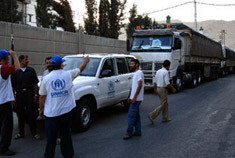United Nations High Commissioner for Refugees 25 July 2006

A UNHCR convoy arrives in Damascus, Syria with aid from a regional stockpile in Jordan. The refugee agency is seeking a humanitarian aid corridor so it can take the relief supplies to displaced people in Lebanon. (UNHCR/N.Magerramov)
UNHCR relief supplies for over 20,000 displaced and distressed people in Lebanon, including many living out in the open in parks or in overcrowded public buildings, are still blocked this morning in Syria awaiting a safe route into Lebanon. It is enormously frustrating to be right on the back doorstep of Lebanon and ready to move in with hundreds of tonnes of aid, but the door remains closed. We have hundreds of tonnes of tents, mattresses, blankets and other aid which could be delivered in a matter of hours if we only had access to the country. We are exploring every option and pressing to move these urgently needed relief items as soon as possible to where they are needed most.
We now have positioned in Syria some 20,000 mattresses, 20,000 blankets; 5,000 family tents; 5,000 bales of plastic sheeting; 10,000 jerry cans; 5,000 stoves and 5,000 cooking sets. And there’s a lot more in our regional stockpiles. In just Jordan and Syria, we’ve got 250,000 blankets; 50,000 mattresses; 30,000 kitchen sets; 22,000 family tents; 17,000 stoves and other relief items. Additional quantities are also available in stockpiles in Kuwait and Iraq.
As the High Commissioner said yesterday, all we need is a green light to go in by road from the Syrian side and we can help ease the plight of tens of thousands of people whose situation is worsening by the hour.
While our supplies remained blocked, four members of UNHCR’s emergency team were told they would get access this morning to Lebanon from Syria via an overland route. They are now on the road from Damascus to Beirut and are expected to arrive in a matter of hours to reinforce our staff already on the ground in Lebanon. By the end of the week we expect to have 25 members of the emergency team on the ground split between Lebanon and Syria.Yesterday, the UN’s Humanitarian chief Jan Egeland visited the Aley valley north of Beirut where we have been working with the Lebanese authorities to help the thousands of displaced to this area since the start of the crisis.
Along the border between Syria and Lebanon yesterday (Monday), our border monitoring teams at three crossing points noted the number of arrivals had dropped to around 4,000, compared to 10,000 in previous days, with many arrivals from south Lebanon as well as small groups of foreign nationals. A small group of people claiming to be recognised refugees – Sudanese and Somalis – were allowed to enter the country and were initially provided shelter and assistance by the Syrian Red Crescent.
An estimated 210,000 people have crossed four border points since the conflict started. Of these, some 100,000 Lebanese and some third country nationals are remaining in Syria. Those living in organised shelters and with host families need support and assistance.
Meanwhile, in Cyprus, we are monitoring the ports and airports for arrivals of Lebanese nationals, as well as people of concern to UNHCR who might be fleeing Lebanon. From our information, which is not comprehensive at this stage, some 10 percent of the total arrivals on vessels are Lebanese.
UNHCR’s portion of the Flash Appeal launched yesterday for the Lebanon crisis totals $18.9 million aimed at helping 150,000 vulnerable displaced people in Lebanon and neighbouring countries for an initial period of three months. As part of the join U.N. approach to the crisis, UNHCR will be responsible for protection activities as well as for shelter, site management and provision of non-food aid items.
Our responsibilities include ensuring the physical and material safety of vulnerable refugees and internally displaced people in Lebanon, Syria and surrounding countries, with particular emphasis on women, children and the elderly. UNHCR’s work will also involve border monitoring and facilitating entry for all new arrivals in Syria and ensuring that they are identified, registered and referred to the appropriate organisation for help. Activities will also include mapping of all sites housing internally displaced people; identifying additional accommodation for the displaced; assisting host families who are now caring for tens of thousands of uprooted people; and the provision of humanitarian assistance, including to besieged communities.
Related Links